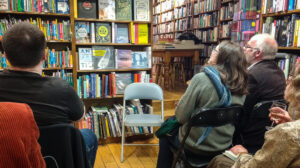‘Today in nearly all sectors of life … we navigate a world increasingly orchestrated not by direct human care and craft but by machines and algorithms. It’s impressive and terrifying just how much human agency we entrust to profiteering technology empires.’ That was Jonathan Simons reading from his introductory essay, ‘Towards a New Renaissance’, in the fourth edition of The Analog Sea Review. We were a small audience of twenty or so gathered in Toppings Bookshop, Ely, sandwiched between walls of travel (Expeditions Unpacked, The Writer’s Journey, Atlas of Dark Destinations) and biography (Montaigne, The Horror of Love, The Light We Carry) on 17th April.
Jonathan was on a tour to promote the Review and the wider analog agenda. While he is an analog apostle and evangelist he also lives in the real world and is not anti the internet. As he says in the opening sentence to his essay, ‘The question is no longer whether our future is digital but to what degree we want to remain human.’ That is to say, how much do we want the digital world to dominate and control our lives?
The language used by Jonathan and the audience was important in allowing the question to be viewed in the wider context. To quote a few phrases: ‘…encourage a deeper lifestyle..,’: ‘…addiction capitalism…’; ‘…need to be free from tyranny…’; ‘…free market is not hospitable to the arts…’; ‘…smart phone addiction changing the way we think…’; ‘…virtual tribalism…’; ‘…lack of social skills…’; ‘…push back against technocracy…’; ‘…protection of civil liberties…’; ‘…losing sight of vision and history…’; and ‘…capitalism fills all space…’.
In my post of 5th July 2020 I said: ‘Analog Sea has a view about the kind of society in which we live and an antipathy towards free market capitalism. It is not party political and it may be political with only a small ‘p’, but political it certainly is. It may be happy to preach to the choir, but change will require political action.’ This was in response to Jonathan’s claim at that time that Analog Sea was not political. Much has changed in the past three years – Covid lockdowns pushing more people on-line and the growth of AI, to instance just two things – and I got the sense this week that supporting Analog Sea is increasingly about taking a political stance. Not an established party one, but surely one located in the left/liberal/green part of the spectrum.

The way that Jonathan now sees the future of Analog Sea appears to be an appreciation of this political reality, of the need to build the constituency and grow beyond a niche interest. The aim is to publish two volumes of the Review every year; and there are plans for an off-line Analog Sea Institute to mentor young readers ‘to tap into the sense of wordness’. He also wants to promote third non-digital spaces – home and work have been invaded and coffee shops have been taken over by Apple. Park benches and quiet corners in bookshops, perhaps.
This was all good stuff and the ‘choir’ gathered in Toppings bought in to the message. But there was a sense in which the anger (not too strong a word) around a medium got in the way of the message. Jonathan explained that the articles in the Review are gathered collectively and selectively, with no agenda, from the ‘wildness of life’ and grouped around themes with ‘unbridled curiosity’. He accepted that some pieces were difficult and academic. What we didn’t get was any sense of what the Review was saying about art and walking, just two of the themes running through some of the articles, for example. Perhaps it was just easier for us to come together in the shared angst about an aspect of the word that makes us feel increasingly uncomfortable.

